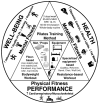Psychophysiological Adaptations to Pilates Training in Overweight and Obese Individuals: A Topical Review
- PMID: 36278570
- PMCID: PMC9589980
- DOI: 10.3390/diseases10040071
Psychophysiological Adaptations to Pilates Training in Overweight and Obese Individuals: A Topical Review
Abstract
The prevalence of overweightness and obesity has been documented as a major public health issue since it has increased at an alarming rate worldwide. Structured physical exercise programs have been reported as an essential strategy for preventing, managing, and treating obesity, inducing critical improvements in various physiological and psychological markers. However, it is unclear whether Pilates training can elicit positive changes in body composition, physical fitness, cardiometabolic health, and well-being among overweight and obese populations. The purpose of this topical review was to catalog studies investigating the physiological and psychological adaptations to Pilates training in order to identify what outcomes have been assessed, the research methods used, and the results. The inclusion/exclusion criteria were met by 14 published articles involving 582 participants (83% female) who were overweight or obese. The present topical review on Pilates training-induced adaptations shows that this widely used exercise type can significantly improve the majority of the selected indicators. These beneficial changes are frequently focused on anthropometric parameters, body composition, glucose, and lipid metabolism, as well as blood pressure in sedentary overweight or obese women. Specialized equipment-based Pilates interventions and trials investigating various mental health indices were limited. Further research is warranted in this area, emphasizing the Pilates training configuration and potential mechanisms behind positive alterations in several psychophysiological markers through large-scale randomized controlled trials with superior methodological quality, implementing long-term interventions in various populations that are overweight and obese.
Keywords: Pilates; exercise; obesity; overweight; physiological responses; psychological responses.
Conflict of interest statement
The author declares no conflict of interest.
Figures
References
-
- World Health Organization Overweight and Obesity. [(accessed on 9 June 2021)]. WHO Fact Sheet N°311 Website. Available online: https://www.who.int/en/news-room/fact-sheets/detail/obesity-and-overweight.
-
- World Health Organization . Noncommunicable Diseases Country Profiles 2018. World Health Organization; Geneva, Switzerland: 2018.
Publication types
LinkOut - more resources
Full Text Sources
Miscellaneous



